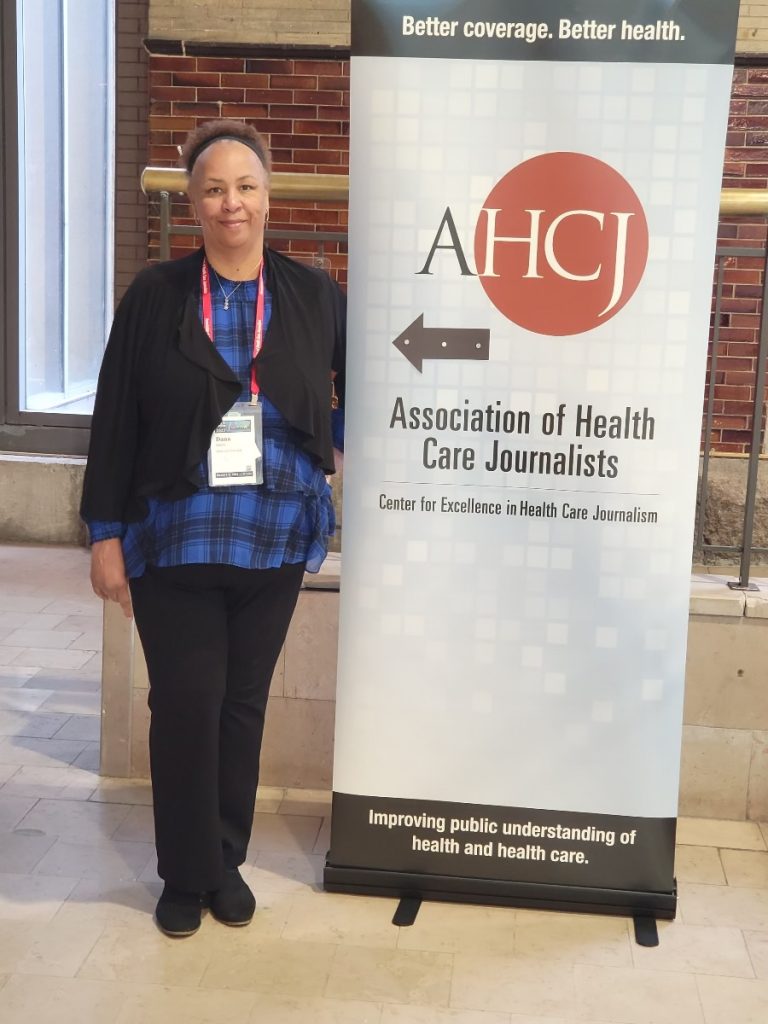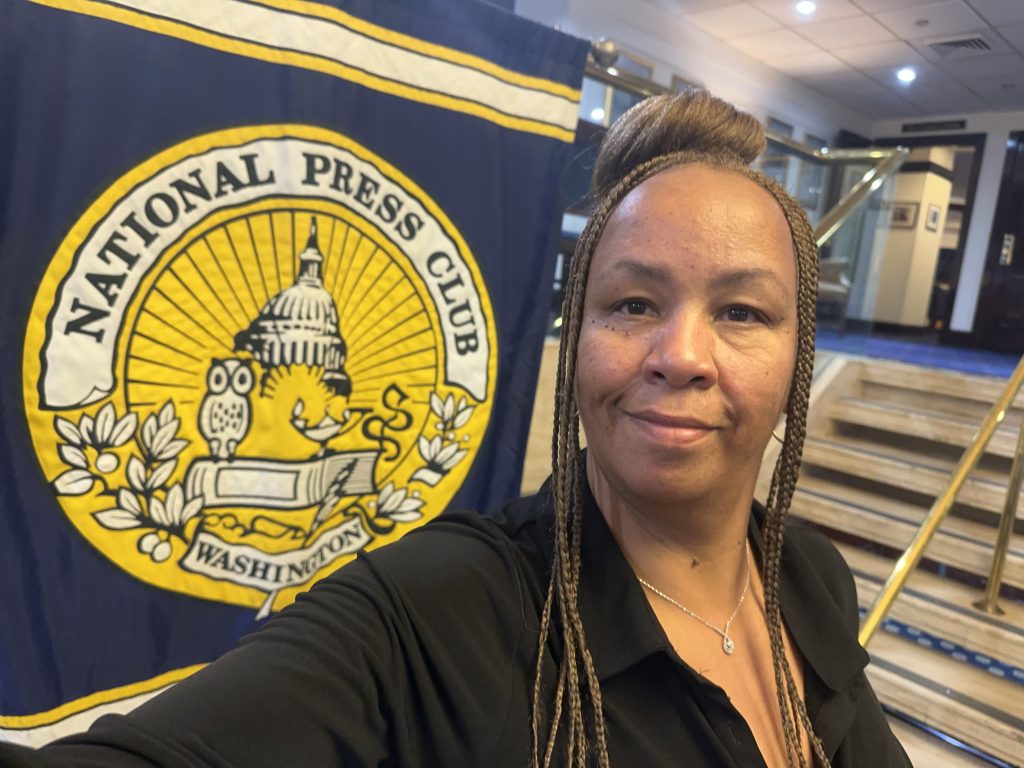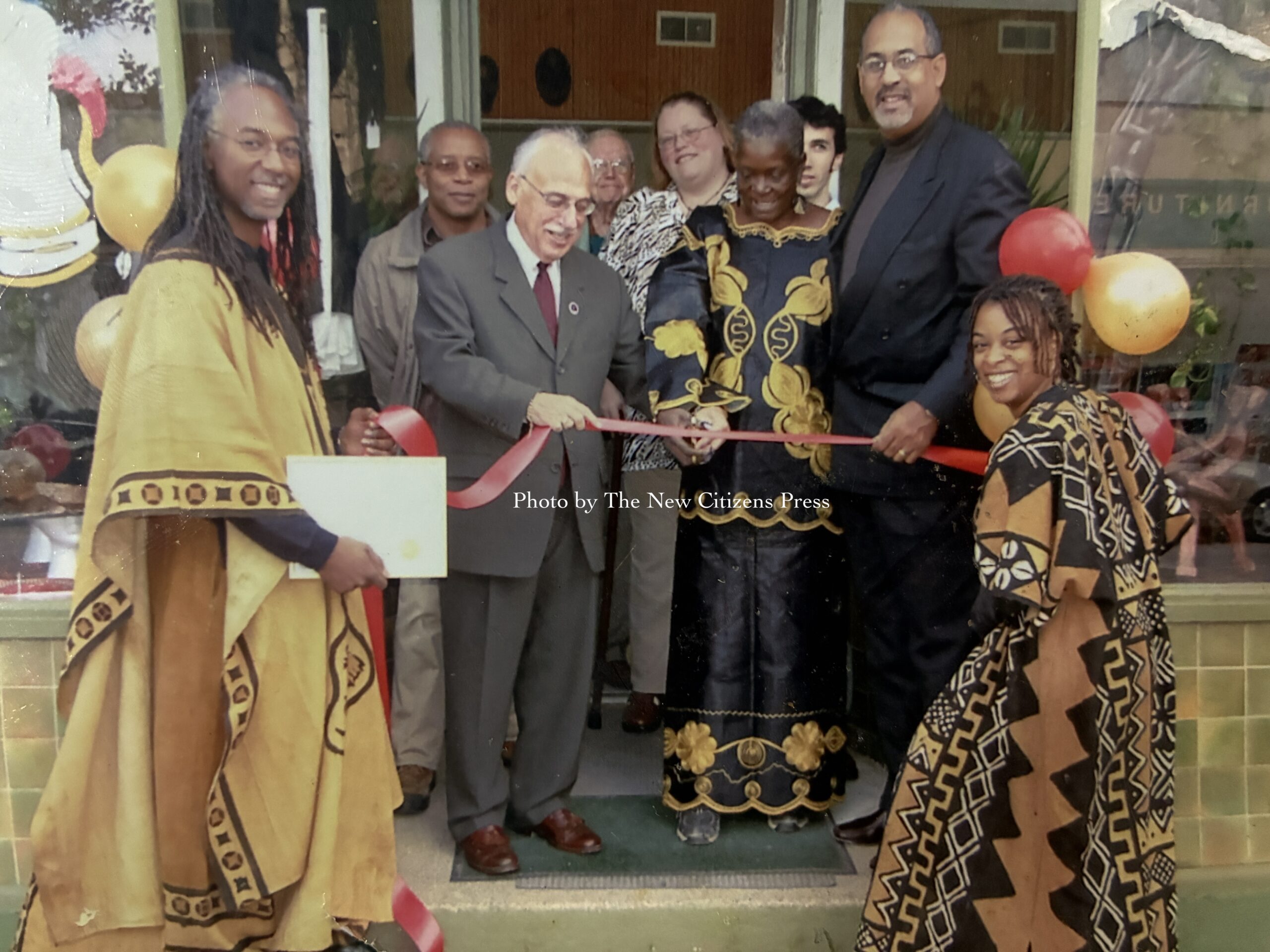Dana James, Founder and Publisher of Black Iowa News at Iowa’s Juneteenth Neighbor’s Day in 2023. James proudly holds the first print edition of Black Iowa News at the event.

Mural by Jill Wells Art at 1171 7th Street in Des Moines, IA.
Photo courtesy of Black Iowa News
By Deborah M. Walker
TNCPNEWS
DES MOINES, IA – The pandemic ushered in numerous changes and new norms, such as systematic lockdowns, masks, virus deniers, eviction moratoriums, and stimulus payouts. During uncertain times, communities and families united on social media and Zoom. The world relied on media as a vital source of information, with millions tuning in to stay abreast of the chaos and to receive relevant news about beloved members of their families they could not see in person or touch.
Fake news websites and misinformation had begun to swirl like a tornado prior to the pandemic. The power of sharing fake content online gave the underground world of internet scammers encouragement just in time for the 2016 United States presidential elections. Sensationalism went directly from the tabloids by the cash registers at grocery stores into the 24-hour news cycle.
There was a backlash against the lack of journalistic integrity and more demand for more objective and reliable news sources, which created a niche for an avenue for Black media entrepreneurs to pave the way to share their experiences.

Dana James at the Association of Health Care Journalists event in St. Louis, MO in March of 2023. Below: Mural by Jill Wells Art at 1171 7th Street in Des Moines, IA. Photo courtesy of Black Iowa News
Black Iowa
The state of Iowa is in the Midwest and is nestled between the Missouri and Mississippi rivers. It is known for its landscape of rolling plains, Prize of Iowa Butter, Republicans, and cornfields.
Dana James, Founder and Publisher of Black Iowa News wanted to publish articles about Black experiences that pushed the boundaries when the inaugural website blackiowanews.com was launched. According to The State Data Center of Iowa and the Iowa Commission on The Status of African Americans, Iowa had a 230.6% increase in its Black population from 1980 to 2021. This is a 96,163 increase for the period. The seasoned reporter and advocate realized she had the opportunity and welcomed the challenges of starting a publication during the pandemic.
James expressed deep concern over the prevalence of deception in the news and information targeted to the Black community and the pandemic’s impact. Black voices were not being amplified or written about when telling stories or providing relevant information in Iowa. That same premise was resonating throughout the country. As a response, James established Black Iowa News as a platform to deliver reliable journalism in the face of misinformation and disinformation for Iowans and beyond.
“I founded Black Iowa News because I was tired of watching news outlets do a poor job of telling Black stories during the coronavirus pandemic and failing to tell us how the pandemic truly affected our communities,” explained James.
How owning media has affected journalism
James said she experienced the challenge of editors controlling the narrative and deciding which stories were told and how they were presented. This occasionally clashed with her own perspective and reporting of the story. However, now, being involved in all aspects of storytelling with a focus on the Black community, she finds it liberating to have the autonomy to convey the stories as she sees them, without constraints.
The decision to venture into entrepreneurship was driven by the evident gaps in reporting that James observed during the pandemic. Witnessing the disproportionate impact of the pandemic on the Black community, she felt a deep sense of responsibility to provide essential information to Black Iowans. This realization was the momentum for creating Black Iowa News and filling the void in reliable reporting for her community.
“My past journalism experiences provided me with the foundation to run my media company, and the anti-blackness I experienced throughout my career in predominantly white spaces made self-employment a necessity,” said James.

Dana James’ father, Lawrence Boone Jr., posing on the Yamahopper in the 1970’s.
Photo courtesy of Black Iowa News
Family influence and its impact on news stories
James said that family has helped to inspire, shape, and mold some of the stories told by Black Iowa News. Her family has always been supportive. For Black parents, raising young female children in predominately white areas was complicated. Even though her parents had been tasked with an extra set of issues while raising their children in an unjust world, love and education weaved their way through their lives growing up in Iowa.
When her mother, Crystal Boone, was alive, she would occasionally ride along with James to interviews and information-gathering expeditions, and the two would discuss the angles of her stories thoroughly. When her mother was stricken with illness and too frail to travel with her, Boone would always have a well-worn spiral notebook and pen on the table, and she wrote detailed notes about James’ daily activities and discussed them with her from the comfort of her favorite chair in the living room.
“Now, I typically discuss my stories with my husband, Conrad; sister, Camille (Boone-Harrison) and brother-in-law, Chris. Invariably, they’ll come up with great questions that move the story forward or ask questions I didn’t think about,” informed James.
Her role as a daughter of Lawrence Boone, Jr. very much influenced James to write the opinion piece “What White People Get Wrong about Black Dads.” It’s apparent that American society hates Black men, said James. In her superlative piece, she wanted to counter the misguided narrative about Black men with anecdotes about her dad, her childhood, and the love, goodness, and motivation he brought to her life.
“My mother worked as an educator, and during her career, I watched as she always fought for Black students. My dad always kept it real about being Black in predominantly white spaces,” stated James.
Often during her career, James said she dealt with microaggressions, slights, and even outright racism, and she would call her mother, who would calm her down and tell her not to view herself through a white lens, which always seemed to find Black people lacking.
“She’d remind me of my own greatness. My mother always reinforced that I am perfectly capable and I don’t need applause or permission from anyone to do anything I want to do,” said James.
Drawing from the invaluable teachings of her parents, James learned the significance of self-worth and the power of staying true to herself without changing for others. Advocating for her- self and others became second nature, and her parents emphasized the importance of education in providing choices and diverse experiences. James is also very close to her sister, and they travel together to industry events. They also talk to each other almost every day to hash out ledes, read content, correct spelling, punctuation, and grammatical errors.
The sister’s father and mother would be impressed by how James has scaled up the family’s cohesiveness since they passed away. As the sisters rewrite text to make it easier for readers to understand, James is prepared for the task at hand – to write honest and good stories about Black people.
The ink-flowing legacy includes her husband and brother-in-law. They have been an integral part of helping James to cultivate and grow as well. The combined influence of her family, education, and career laid a strong foundation for James to establish Black Iowa News from scratch.
Navigating racism in the publishing industry
James argued that being a Black woman in Iowa publishing poses challenges, given the scarcity of representation in the field. Initially lacking a local network for support and guidance, she sought resources beyond the state’s borders, which ultimately proved advantageous. James details her past struggles with racism.
“In a past journalism job, a new white manager disliked me on sight and began discrediting me, dismantling my job and making the workplace toxic. The white editor I’d had for years, who’d always been a champion of my work, told me our manager didn’t like me because I was Black. I left the job without giving any notice because I no longer wanted to be a part of such a racist environment. That situation taught me that toil in anti-Black environments is not required, healthy, or virtuous. It also helped me learn the lesson that I could create an environment for myself and others to thrive.”
There was help and support for James. Audrey Burgs, a former night city editor at the Des Moines Register, has been a constant source of inspiration for James. Their first encounter was during James’ time as a reporting intern at the Des Moines Register in 1999. As Black women, they both faced subtle discrimination and encountered individuals who underestimated their worth during their tenure there. Despite this, they both produced exceptional work that often went underappreciated, but the sisterhood they cultivated with each other provided invaluable encouragement. Burgs continues to edit James’ work, using her discerning eye to elevate its quality consistently. Burgs’ unwavering support and mentorship have been instrumental in her journey as a writer and now as a publisher, informed James.

Dana James at the National Press Club in Washington, DC on August 3, 2023. Photo courtesy of Black Iowa News
Challenges Black readers face
Both as a reader and a reporter, James had long been dissatisfied with the lack of nuance and sensitivity in how news organizations portrayed Black stories. She noticed that Black voices and perspectives were often overlooked, and there was a need for reminders to include Black individuals in interviews and photographs. The fact that white individuals predominantly decided the angles and narratives of Black stories added to this frustration. Witnessing the marginalization of Black people throughout the story development process fueled Dana’s determination to prioritize and center Black Iowans in every aspect of her work at Black Iowa News.
“I definitely feel a responsibility to other Black people and to give them my best efforts as a writer, reporter, and publisher. I view other Black Iowans as my community and extended family. You want the best for your family, you fight their fights, and even if they’re wrong, you never down them but help them improve. You celebrate their wins,” said James.
Discrimination has personally impacted James on a profound level, she said. In 2005, James experienced the loss of her mother after an extended illness, and she and her sister remained by her side in the Intensive Care Unit (ICU) for a grueling 90 days. Throughout this period, they encountered distressing situations, including encounters with unsatisfactory nurses. On one occasion, a nurse hastily pronounced their mother’s time of death when she flatlined, but her mother ultimately lived for about three more months. On another occasion, In her mother’s darkened ICU room, James watched as alarm bells rang, but the nurse on duty ignored it and kept eating lunch.
“I thought about those experiences as the coronavirus pandemic swept the nation and dispropor- tionately harmed Black people. That directly led to the formation of Black Iowa News and my desire to produce credible journalism in a time of misinformation and disinformation,” said James.
Support Black Iowa News
For more information about Dana James and Black Iowa News, visit their website at www.blackiowanews.com.
Catch James in her podcast, 2 Black Women, Coffee & Conversations with Lya Williams. Available on iHeart Radio, Spotify, and YouTube at
Sign up to receive a copy of the Black Iowa Newspaper in the mail or as an email subscription: https://forms.gle/fvGHAiiPiFyXETCP6
Newsletter sign-up link: https://blackiowanews.com/newsletter/
TNCP staff also contributed to this story.




